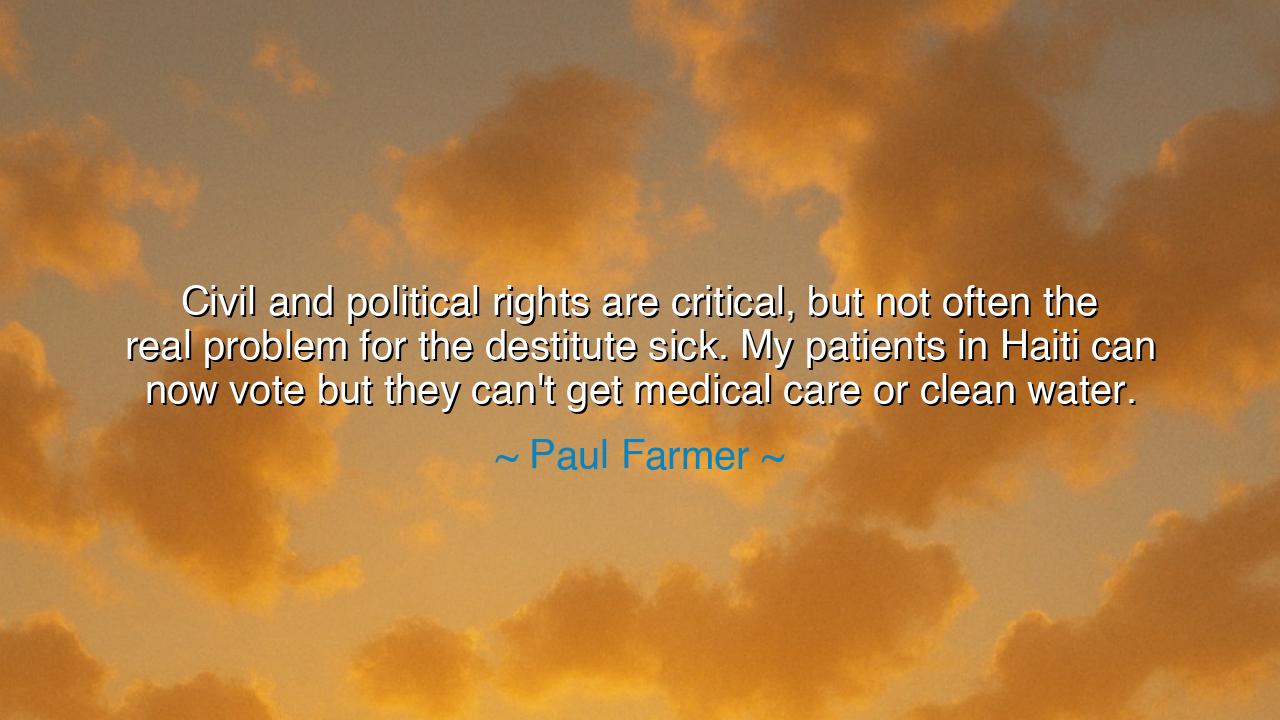
Civil and political rights are critical, but not often the real
Civil and political rights are critical, but not often the real problem for the destitute sick. My patients in Haiti can now vote but they can't get medical care or clean water.






In the voice of Paul Farmer, physician, anthropologist, and servant of the poor, we hear not merely an observation, but a cry from the heart of humanity: “Civil and political rights are critical, but not often the real problem for the destitute sick. My patients in Haiti can now vote but they can’t get medical care or clean water.” These words pierce the veil of complacency and strike at the root of injustice. For what use is the freedom to choose leaders, when the body is consumed by hunger, or when a child’s life ends for want of clean water? Farmer speaks not against freedom, but for a deeper one — a freedom to live, to be whole, to be healed.
The meaning of this quote lies in the chasm between ideals and reality. In the modern world, we speak proudly of rights — of liberty, of speech, of the vote — and these are indeed sacred. Yet Farmer reminds us that for the poorest, these noble words remain distant echoes, drowned out by the cries of physical suffering. To cast a ballot is a symbol of dignity, but to drink clean water is the substance of it. Without the essentials of survival — health, food, shelter, and care — the higher rights ring hollow. He teaches that compassion must be concrete; that justice must descend from the realm of principle into the mud and blood of real life.
The origin of these words is found in Farmer’s years among the hills and slums of Haiti, where he built hospitals for those abandoned by both wealth and policy. He lived among the sick, not as a distant benefactor, but as a brother in their suffering. There, he saw the contradiction of modern progress: a world that celebrates democracy while allowing disease to ravage its poorest citizens. The right to vote had been won — a monumental step — but the right to live in dignity had not followed. Farmer’s lament is not cynicism; it is moral realism. He knew that the promises of civilization are incomplete until they touch the least among us.
In this, Farmer’s spirit echoes that of the ancient prophets, who cried out against the same hypocrisy in their own times. The prophet Amos thundered, “Let justice roll down like waters, and righteousness like a mighty stream.” He spoke not of legal rights alone, but of justice that nourishes — the justice that fills the hungry and heals the broken. So too did Paul Farmer call for a new kind of righteousness: one that binds the wounds of the poor, that rebuilds the foundations of health and dignity. For he understood what the ancients knew — that freedom divorced from compassion becomes vanity, and that the true measure of a society is not the eloquence of its laws, but the mercy of its actions.
Consider, as Farmer did, the story of Florence Nightingale, who walked through the filth of wartime hospitals in the Crimean War. She saw men dying not from bullets, but from infection and neglect. Her mission was not political but profoundly human: to restore health where indifference had taken hold. Like Farmer, she understood that the fight for human dignity begins with the care of the body — that to save one life is to affirm the worth of all. In her lamp, as in Farmer’s hospital, there burned the same eternal light — the light of practical compassion, of love made visible through service.
There is also a warning in Farmer’s words. When a society proclaims freedom but tolerates deprivation, it builds its house upon sand. Civilization cannot stand on the shoulders of the starving. A democracy that celebrates elections while neglecting hospitals and wells is like a temple built without a foundation. Farmer calls us to look deeper — to see that true liberty requires equity, that the health of the people is not charity but justice. The destitute sick are not burdens upon progress; they are the very mirror of our humanity. Their suffering reveals the distance between what we say we are and what we truly are.
The lesson, then, is both moral and practical: that justice must be embodied in care, and that compassion must be measured not in sentiment but in structure. To honor Farmer’s teaching is to act — to build clinics, to support clean water, to speak for those whose voices are lost to hunger. Wherever you are, look around and ask: who suffers unseen? Whose body bears the cost of our indifference? Then move your hands to heal, your mind to innovate, your voice to demand change.
And so, let these words of Paul Farmer be remembered not as an accusation, but as a summons. Civil rights and political freedom are the pillars of a just world, but they must stand upon the firm ground of human welfare. To heal the poor is to fulfill the deepest promise of civilization. The vote gives the people a voice — but the well, the clinic, the bread, and the medicine give them life. And life, my children, is the first and greatest right of all.






AAdministratorAdministrator
Welcome, honored guests. Please leave a comment, we will respond soon